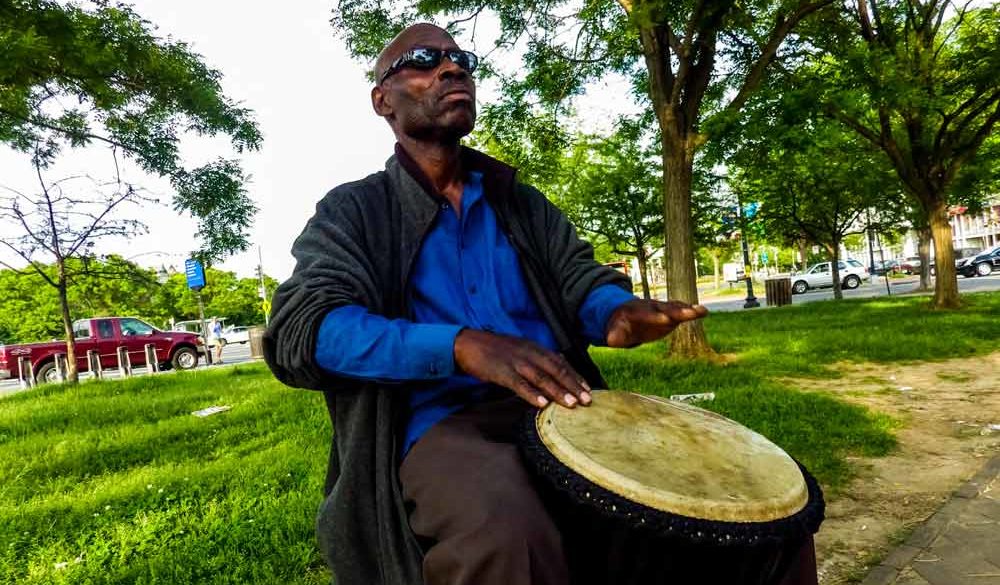The sound of an African djembe drum marks the beat. With the scramble of the Metro rush hour, a man who named himself makes a home out of the concrete, the trees and the stoplights outside of the Columbia Heights Metro station.
Like the staccato beats of his palms on the skin of the drum, Bilal (pronounced blah-ow) speaks with short, but determined words. When he feels strongly about what he is saying, his voice becomes gritty and low.
“I’ve been shot. I’ve been beat up. I’ve been robbed. I’ve been in prison. I was in love.”
Each snapshot of his life sounds like a growl or a question with his eyebrows raised as if in surprise.
He hides his orange-tinged eyes behind dark, horn-rimmed sunglasses. He says that even though he is homeless, he doesn’t want to “look homeless.” He dresses well, with pressed brown slacks, clean leather shoes, and a blue button-up shirt.
For 15 years, Bilal laid pipes in the ground in the District of Columbia. Now, he sleeps on the same ground where he laid those pipes, supported by checks from the government.
“I did have a place one time. I had a stressful job, workin’ every day. But when I lost my job, I lost my place.”
Bilal, 56, whose given name is James Stewart, has been homeless for maybe 12 years, maybe 17. The number changes with each telling.
Even though it was so long ago that he can barely remember when he had a job, he still is proud of what he can do with his hands, whether laying pipes or beating drums.
“I’m not a laborer. I’m a skilled, skilled laborer.”
Living in the ghetto of Columbia Heights, Bilal described having to fight for his 12 sisters and brothers, while his mother worked three jobs to take care of each of them.
He stretched his finger toward the corner of the street, pointing to where his father died after a driver ran a stoplight. He was eight years old. Then Bilal pointed even further to where he lived, only a few blocks away. “I had to prove myself to some guys that I was a man,” he said. “I used to have to whoop people’s ass growing up.”
He described never fighting back until he “just got tired of it.” He said he heard threats like, “We’re gonna take your lunch. We’re gonna kick your ass.”
“I wish I didn’t have to grow up like that” he said. “I used to think, ‘Why I’m living?’” He leans forward, wrinkles his nose, and mutters as low as he can, “I’ll live as long as I can, and I’ll die if I must. If I must. If I must.”
Now, his daily mantra includes being around positive people, going to AA meetings, and playing the drums whenever there’s a nice day. “Even though we all gon’ go one day … I try to make every day better.”
I met Bilal on Mother’s Day weekend. He used to live with his mother, but when she passed away, so did her home. He later stayed at different homes with different members of his family.
He was passed from side to side – “I stay at this place, that place, this place, that place” – until finally, he ended up in the only place he could.
He planned to visit his mother’s grave that he said was in Arlington Cemetery. He added one complaint, though. “They don’t like putting flowers in graves up there.”
He then exclaimed how he was excited to see his oldest son the next day. He puffed out his chest, saying he was proud that he knew all his children’s birthdays. He added whatever made him more proud: none of them went to jail, none of them used drugs, and “they were all from the same woman.”
He said his 33-year-old daughter earned a Ph.D. and works at a law firm. Bilal described her as working for the homeless “so others may eat.” His 31-year old son is married and in the Navy. Bilal said he hasn’t seen him for seven or eight months now. His eldest, 35, cooks for an uptown restaurant. He said he was willing to go to jail for them if it meant protecting them.
Now, what keeps him occupied is playing his music, his wish to treat others the way they should be treated, giving advice – “Money’s not everything. Remember that” – and understanding how others see him. “A lot of people, they look down on me. A lot of people look up to me.”
But he knows now how to let it go.
He turned his head to look at the blue sky through the trees. “Look up. Who’s up there? That’s everything? Who wakes you up in the morning? Who do all that? I sure can’t do it. Man can’t do it. Who brings the sun up in the morning? Man can’t do it. Who makes it rain? Man can’t do it.”
If he could be remembered for one thing, he said, “That I try to live my life good.”
02.23.2010 (Update)
Bilal’s given name and a video of his drumming have been added to this stor2.





